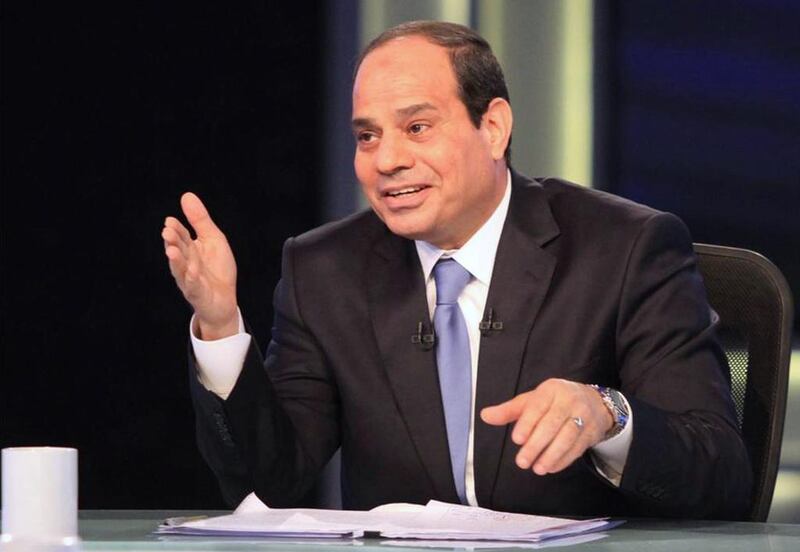CAIRO // Abdel Fattah El Sisi, Egypt’s former military chief who is poised to win the presidency in elections later this month, said he plans to improve people’s living conditions within two years but will step down if they rise up against him.
Mr El Sisi was speaking with the UAE-based Sky News Arabia, giving his first televised interview as a presidential candidate to foreign media.
The first part of the interview was aired on Sunday.
Riding on a wave of nationalist fervour, the 59-year-old Mr El Sisi faces a single rival in the two-day vote which starts on 26 May.
The media and supporters tout him as the nation’s saviour for ousting the elected Islamist president, Mohammed Morsi, in July following massive rallies against him.
The protesters were complaining that a year into office Mr Morsi and his Islamist group the Muslim Brotherhood were monopolising power. Mr Morsi refused to step down or hold a referendum on his leadership following an ultimatum from Mr El Sisi.
The military also moved in to replace longtime autocrat Hosni Mubarak in 2011 after days of protests against him. Mubarak stepped down, and the military ruled for a transitional period before Morsi was elected as part of the Brotherhood’s steady, subsequent sweep at the ballot box.
“Do you think I will wait for a third time? If people go down to protest, I will say, I am at your service,” Mr El Sisi said. “I can’t wait until the army asks me to (step down), I can’t be like this. I fear for my country. I fear for the people.”
Mr El Sisi retired in March to run for office, but he was a career military officer and is unlikely to be at odds with the armed forces, which have provided all of Egypt’s presidents except for Mr Morsi since 1952. Mr El Sisi was head of military intelligence when the uprising against Mubarak erupted in 2011 and was promoted to defence minister by Mr Morsi.
This was Mr El Sisi's second televised interview. Last week, he gave his first interview to two Egyptian private TV stations. He has so far made no street appearances campaigning because of security concerns.
In this interview, Mr El Sisi repeated his criticism of Morsi’s term in office and the Brotherhood’s rise to power, saying the group maintained a parallel leadership and was concerned about amassing power and not solving the country’s problems. He said the group must reassess its ideology.
Mr El Sisi said the Brotherhood has lost the trust of Egyptians. “It is their problem, not mine. They need to re-evaluate themselves,” he said, accusing the group of turning a political problem into a religious war.
He said he would not allow a religious leadership, as he said the Brotherhood tried to present itself, to exist in parallel to the state and its religious institutions.
“It is not an animosity, it is not revenge between me and them,” he said.
The government has branded the Brotherhood a terrorist group, accusing it of orchestrating a violent campaign to destabilise the country. The Brotherhood denies it adopts violent means and accuses the government of seeking to smear its name.
Thousands of Morsi supporters and leading figures in his Brotherhood are behind bars on charges varying from holding illegal protests to inciting and carrying out violent attacks and co-operating with foreign militant groups. More than 1,300 were also killed in the security crackdown on protests.
Mr El Sisi refused to comment on mass trials and sentences against Brotherhood members, including a death sentence already issued against the group's leader Mohamed Badie on charges he instigated violence. The sentence can be appealed. He said the courts are independent and the law must be respected.
Prosecutors on Sunday said seven alleged Muslim Brotherhood members were sentenced to life in prison for blocking a highway and damaging a security post outside of Cairo last summer after security forces violently broke up sit-ins supporting Mr Morsi.
Another court on Sunday sentenced 36 students from an Islamic university in Cairo to four years imprisonment for taking part in a December protest against Mr Morsi’s overthrow.
* Associated Press





